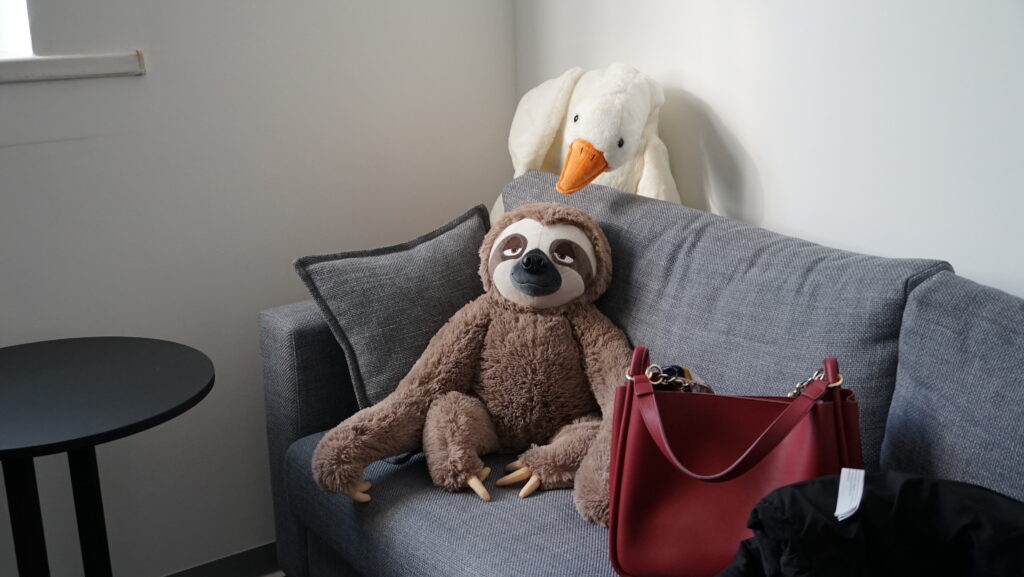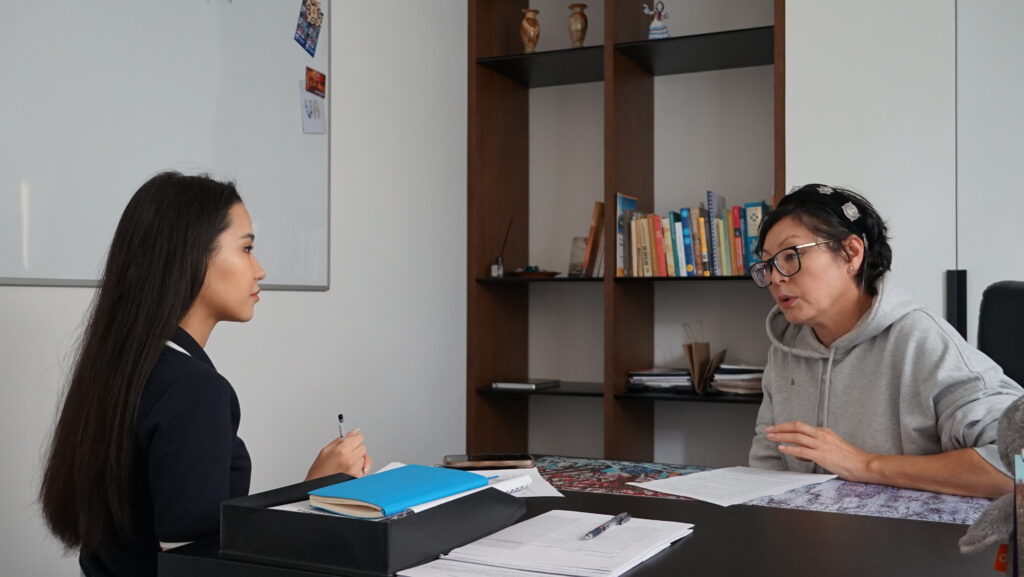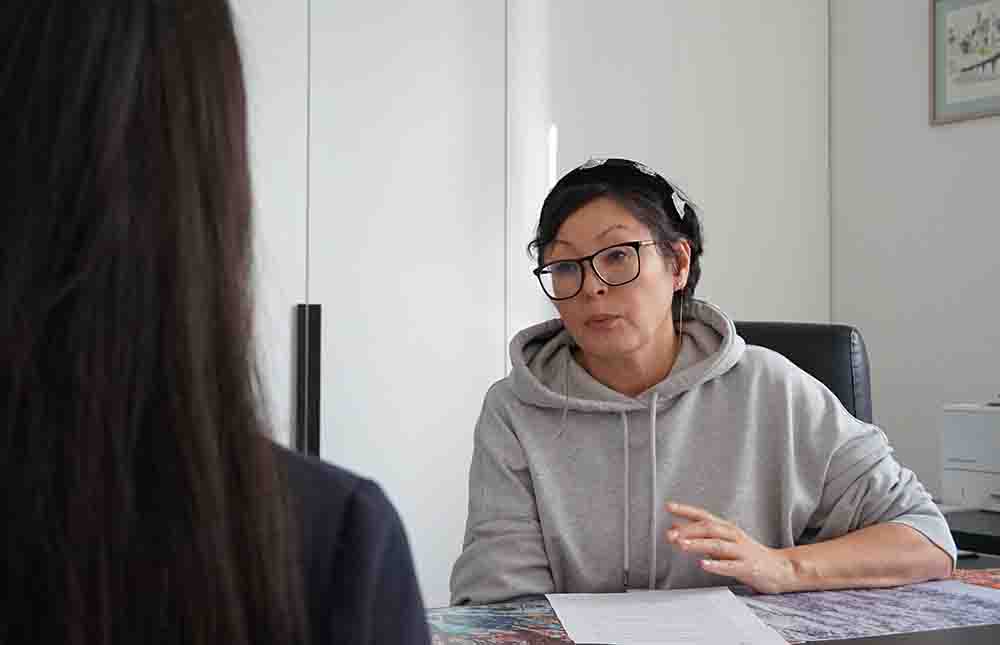KIMEP University’s College of Humanities Sciences and Education focuses on developing students academically and as community members. The college’s dean, Juldyz Smagulova, said it is committed to helping students prepare for their future and find their passions.
Dean Smagulova is a sociolinguist, researcher, and educator with a keen focus on bilingualism, and language education. On Friday afternoon, right before the study break began, Smagulova was in her office in a gray hoodie and her hair pushed back in a black and silver hairband. It was a casual afternoon. She is very approachable in a confident way that makes you feel at ease.

Her office includes a filled bookcase and a purple and white orchid on her desk near the window. A stuffed animal sits on her desk and as well as a larger toy sloth and goose on her sofa, which sits under two small paintings. The toys are from her students, she said. She often pauses before answering questions, as if she’s thinking about how to answer it. Smagulova is friendly and peppers us with questions about who we are and what we want.
But I had more questions for her, CHSE, and how she ended up behind the dean’s desk at KIMEP.
Q: As the founding dean of the College of Human Sciences and Education, what was the most surprising or unexpected part of building the college from the ground up?
A: The most surprising, was actually becoming an administrator, something I never planned. I had always intended to be a researcher and a professor. I ended up leading this unit, which started as a language center and evolved into a full-fledged college. I didn’t realize I had leadership skills until I was in the role. I found that I really enjoyed meeting people and realized I was good at communication and instruction. I discovered many skills and qualities I didn’t know I possessed.
Q: The name change to “College of Human Sciences and Education” suggests a shift in focus. How does this new name reflect the future direction of the college, and how do you see the college evolving in the next five years?
A: I wouldn’t say the shift in focus completely changes what we do, but it slightly expands our scope. We started with humanities and teaching training programs and have since opened up cognitive science and psychology. The new name better reflects our broader mission.
Q: With the new programs in psychology and cognitive sciences, what is the most exciting development for students?
A: The most exciting part is that we now offer these innovative programs. Our cognitive science program, in particular, stands out because it focuses on the human aspect of human-computer interaction. It applies psychology and linguistics to language modeling and natural language processing. No one else in the region offers this, and with the growing AI industry, there are huge opportunities for our students with excellent starting salaries. The psychology program also addresses the pressing need for mental health specialists, allowing students to contribute to local market development while understanding their own mental health better.
Q: Is the new psychology lab already open, and how will it benefit students practically? Can other students from different colleges use it?
A: We have two labs. The first is a teaching lab equipped with computers and software that allows students to analyze data and develop quantitative skills. We plan to upload software that enables them to conduct psychological experiments, including digital and virtual ones. This lab is designed for basic research skills that psychologists need, especially if they plan to pursue graduate studies. The second lab is a research lab, built to support both faculty and students in developing their research skills collaboratively. I’m particularly excited about the eye tracker equipment we’re acquiring—no one in the country has it. This will allow us to conduct cutting-edge research in psycholinguistics, psychology, and marketing. We are very much looking forward to it. Moreover, other students from other colleges can also use it if they’re conducting research that requires that equipment, so we’re open to collaboration.
Q: Why did CHSE add computational linguistics and AI to the curriculum?
A: That’s part of our cognitive science program, which is interdisciplinary—blending linguistics, computational linguistics, and psychology with a focus on cognitive psychology and AI natural language processing. We added this because AI is now a part of our lives, and it’s here to stay. We lack specialists in this field, and it’s a fast-growing industry. One major challenge is the lack of multilingual skills; AI mainly operates in English, and other languages are lacking. We are well-positioned to fill this need in the local market for Kazakh, Russian, and potentially other languages, as the tools must be available in our local languages to bridge the gap in access.
Q: What do you think about Chat GPT?
A: There’s a lot of discussion about AI and its implications for learning, not just here at KIMEP but globally. Many agree that generative AI tools can significantly aid students in their work. However, there are concerns about the impact on deep learning. If students aren’t reading or writing for themselves, they miss out on the learning process. Writing isn’t just a product; it’s a learning process. We need to find a balance between utilizing these tools and ensuring students actually learn. We’re still discussing this, but it’s clear we haven’t found a definitive solution yet.
Q: What was the most challenging decision you’ve had to make as a dean?
A: Restructuring was the most difficult. I started as the director of a language center, where 80% of our faculty lacked master’s degrees due to changing ministerial requirements. We had to let many faculty members go while offering opportunities to improve their qualifications through our master’s program. It was tough to say goodbye to those who decided not to pursue further education.
Q: You recently co-authored a dictionary of sociolinguistic terms in Kazakh. How do you think this project ties into your work as an educator and researcher at KIMEP?
A: As a sociolinguist, my research focuses on sociolinguistics and language revitalization, particularly for Kazakh. I understand that language planning requires professional terminology to be effective. For sociolinguistics topics in Kazakh, we need this terminology because the language of science has very specific terms. If we lack these, the entire field suffers. I hope this project will have a meaningful impact, encouraging knowledge production in Kazakh rather than just translations. For instance, the field of second-language acquisition isn’t widely researched in our region, and we lack even basic terminology for essential concepts like “input” and “output.” Without proper terms, we can’t effectively discuss language acquisition processes. That’s why terminology is so crucial.
Q: You were invited to speak at Nazarbayev University’s Dean’s School to over 80 academic leaders. What message or advice were you most passionate about sharing with other deans?
A: I focused on my personal experience, emphasizing the importance of educational quality. When building our college, we were committed to providing quality education to our students. Every change we made—whether letting people go, hiring new faculty, or opening new programs—was designed to benefit our students. My main message to fellow deans was to emphasize pedagogical and instructional leadership. We need to find ways to improve teaching quality and enhance student experiences so they become better specialists and can secure jobs after graduation. This aligns with our KIMEP strategy, “Committed to Excellence.”
Q: Like you, students have to play multiple roles at KIMEP. What advice would you give them when they are students, researchers, and community members?
A: I would advise them to prioritize, manage time effectively, choose their friends carefully, and read books. Research shows that your future success often depends on the people you surround yourself with. If you spend time with motivated, hardworking individuals, you’re more likely to succeed. While having a social life is important, it’s important to find balance and not overload yourself with tasks, as that can lead to cognitive and emotional burnout. Focus on what matters most and eliminate unnecessary distractions. I also encourage reading. Reading fiction, for instance, offers valuable lessons about characters and psychological choices, which can enhance your understanding of human behavior. When I was a student, I read two books a week, sometimes even a book a day! It’s beneficial for vocabulary and overall language development. So, remember: choose friends wisely, manage your time effectively, prioritize, and read books.
Q: What’s one piece of advice you would give to students who are still uncertain about their future or struggling to find their passion?
A: I recommend talking to faculty for career advice. Many professors can help identify your strengths and guide you. If you’re unsure about your path, don’t worry too much; life is long, and it’s okay to make mistakes or change direction. Many careers today didn’t exist five years ago. So study hard, develop skills that are transferable across professions, and remember that reading is vital.
Q: What opportunities are students at the College of Human Sciences and Education getting that they might not find in other universities or programs in Kazakhstan?
A: I believe we provide very high-quality education, similar to what students might receive in other countries. Our courses, textbooks, and faculty have international experience. Our small college size allows for individualized attention; we know our students by name, creating a family-like atmosphere. This combination of quality and a collegial environment helps our students thrive.
Q: In a field traditionally dominated by men, you’re one of the few women deans at KIMEP, if not the only one. How does this shape your leadership style and approach, and what message do you hope to send to young women aspiring to academic leadership?
A: I’ve never really thought about it, as academia here at KIMEP operates as a meritocracy. I don’t feel disadvantaged by being female. However, I realize many see me as a role model, which carries responsibility. It means I have to work harder and maintain professionalism and ethics because people look up to me. Also, there is one quote that I always tell people: “If you can choose between being right and being kind, always choose being kind.” You know, you can make really harsh decisions and say harsh things to people, but if you do it lovingly, and in a kind way, it helps everywhere. So, I do care about not only the professionalism of my faculty but I also care about the atmosphere. I want us to be in a collegial place, where people are not afraid to come to work. I really hope we are that kind of workplace.


